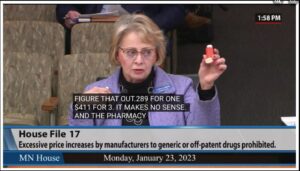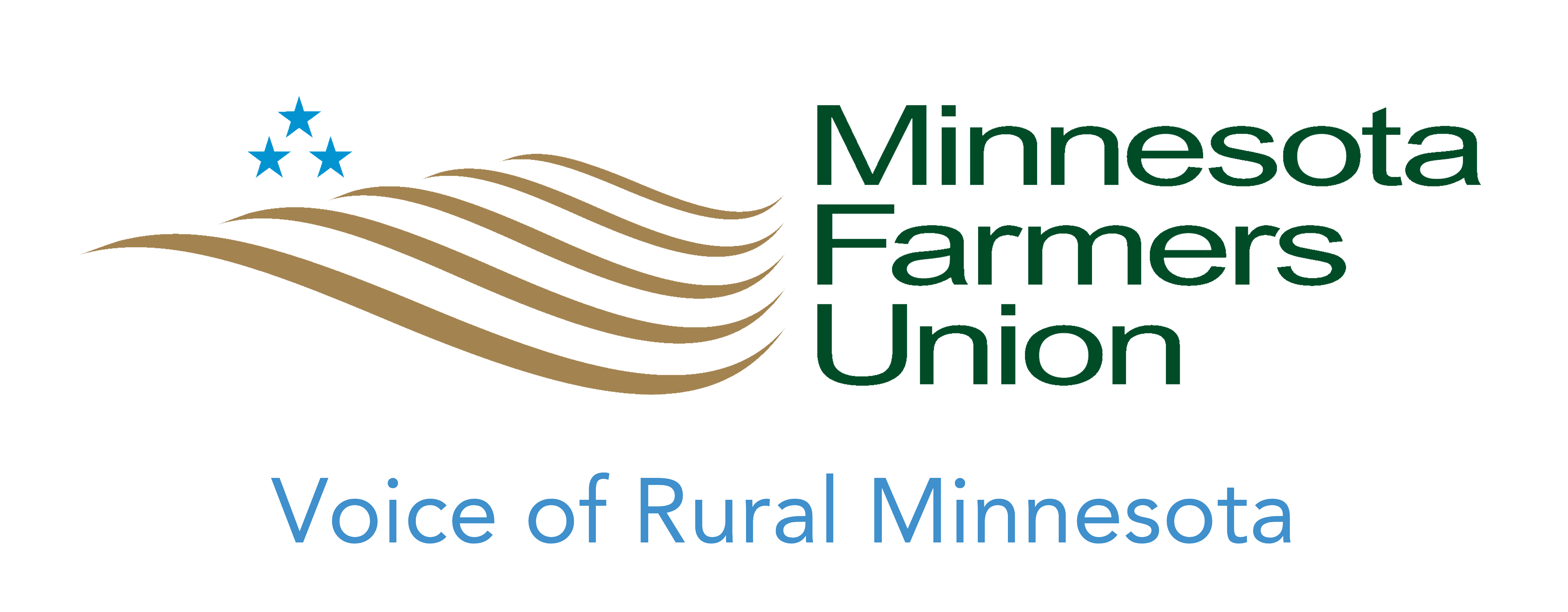Legislative Update: Governor’s budget released
 LEGISLATIVE UPDATE: Governor’s budget, RFA fund, Rx availability, unanimous vote on Thom Petersen confirmation
LEGISLATIVE UPDATE: Governor’s budget, RFA fund, Rx availability, unanimous vote on Thom Petersen confirmation
This year, as with other odd numbered years, legislators are charged with crafting a two-year budget for the state. And unlike the federal government, there is real pressure to reach a final deal—state services will shut down unless a deal on a balanced budget is reached by Friday, June 30.
If the first step in the budgeting process is the release of the December budget forecast which projected a $17.6 billion budget surplus last month, the next is Gov. Walz releasing his budget request. The governor’s budget is just that—a request. It does not carry any special legal weight or lock the legislature into funding certain programs. In fact, the legislature could scrap the entire document and choose to fund nothing the governor recommended.
That said, state law requires the governor to submit his proposed budget to the legislature and the request typically serves as a starting point for committee work to craft a budget. Most proposals will be heard in context of amending or changing what the governor proposed. This request also carries weight because it reflects agency work throughout the summer and fall. At the Capitol, agency heads and their teams—including Commissioner Petersen at the Department of Agriculture—will advocate for their provisions in the governor’s request.
Last Wednesday, Walz met with MFU and other agriculture groups at Ag Expo in Mankato to discuss his budget request before formally releasing portions of the package on Thursday. The entire request was released on Tuesday, Jan. 24 in alignment with the deadline in state law.
Importantly—and released early as part of a health and safety package—Walz used his request to renew his call for establishing a MinnesotaCare public option that would allow farmers and other independently employed people to ‘buy-in’ to the state program that covers low-income Minnesotans. This is a priority for MFU, because farmers and other small business owners and independently employed people need to purchase insurance on the individual market.
“We’re grateful to see Gov. Walz and Lt. Gov. Flanagan continue their leadership on establishing a MinnesotaCare public option,” said President Wertish in a release following the announcement. “For too long, farmers and other entrepreneurs and small business owners have faced unaffordable health insurance costs, which limits rural economic vitality.”
MFU has advocated for this proposal since the Dayton administration.
In alignment with MFU’s priorities, the governor’s budget proposes investing in:
- Meat Processing
- Grants to startup or expand existing plants through the AGRI Value-Added Program – $500,000
- Meat processing liaison – $150,000 (leveraging $150,000 from federal government)
- Soil Health & Climate Resilience
- Expanding the Soil Health Financial assistance program which provides equipment grants for farmers – $4 million
- Funding investments that improve water quality through the Ag Best Management Revolving Loan Program – $4 million ($6 million in ’26-’27)
- Hiring a Climate Coordinator – $300,000
- Establishing a grain indemnity fund to protect farmers affected by elevator collapses – $5 million
- Funding for biofuels infrastructure – $3 million
- Resources for beginning and emerging farmers including:
- Expanding the Emerging Farmers Office – $700,000
- Equipment and infrastructure grants – $400,000
- Services to immigrant and BIPOC farmers and food businesses – $500,000
- Funding for the Good Acre’s LEAFF program – $100,000
- Expanding staff capacity at the Rural Finance Authority (RFA) – $300,000
- Expanding the MN Grown program – $150,000
- Providing entrepreneurial support through expanding the New Markets Cost-Share program – $500,000
- Replenishing the ag emergency account – $1.5 million
- Expanding farm safety outreach and equipment grants and improving mental health outreach and services – $500,000
- Funding for noxious weed programs – $800,000
- Grants to Farmers Market hubs for aggregation, staff training, and program development – $700,000
- Hiring an additional international trade representative at MDA – $300,000
- Pollinator research at the University of Minnesota – $200,000
- Support for county fairs – $400,000
The governor’s budget for agriculture also proposes updating MDA’s technology to improve service, modernizing and streamlining food licensing and securing funding for the RFA’s bonded loans.
You can view past budget requests—including the supplemental request for 2022 on Minnesota Management and Budget’s website.
With the governor’s budget formally released, the next step in the budgeting process is an updated budget forecast which is due to the legislature by the end of February. Traditionally—and assuming there are big changes from December—the governor will update his budget recommendations.
Following that, committee work will heat up ahead of first deadline on Friday, March 10. The final deadline for large appropriation bills—like the agriculture omnibus—is April 4.
Of course, some legislation will move ahead of committee deadlines and outside of larger omnibus bills. In the agriculture committee, MFU has asked that the legislature approve $50,000 to replenish the Rural Finance Authorities revolving loan account which is set to run out of funding later this year. Chair Samantha Vang (DFL-Brooklyn Center) and Rep. John Burkel (R-Badger) are leading that effort.
“While our members are diverse in their operations, they are unified in the fact that affordable financing often presents a significant challenge, particularly when families are already faced with uncertainty related to increasing input costs, unpredictable weather, and generational farm transition,” said MFU President Gary Wertish in written remarks to the committee.
In 2017 and again in 2020 MFU advocated for the legislature to act early on RFA funding. Doing so this session will help provide certainty, maintain service, and allow the department to lock in interest rates.
Another bill that will likely be up for votes on the floor ahead of larger omnibus packages would allow immigrants without Social Security numbers to apply for and earn a drivers license. As in the past, MFU shared our strong support for this proposal. In formal comments submitted to legislators, Wertish shared that “allowing immigrants to earn a drivers’ license would respect [their important] contributions, improve public safety, and help farmers who rely on workers being able to travel to work.”
We’ve also found opportunities to continue to be active on lowering prescription drug prices. Dakota County Farmers Union President and Executive Committee member Linda Larson delivered testimony to the House Commerce Committee in support of establishing a Prescription Drug Affordability Board (PDAB). This proposal would give the state some oversight over companies price gouging generic prescription drugs and is being brought forward by Chair Zach Stephenson (DFL-Coon Rapids).
MFU’s written remarks to the committee pointed out that healthcare costs in Minnesota have increased by 15 percent since 2016 with Minnesotans spending $5.6 billion on prescription drugs last year. Much like in agriculture, consolidation in this industry is a driving force behind company’s ability to squeeze money out of patients—in 2017, just four companies produced more than 50 percent of all generic drugs.
Finally, the state Senate is charged with confirming members of the governor’s cabinet. Last week, MFU shared testimony in support of confirming Commissioner Paul Marquart to lead the Department of Revenue.
“Based on our experience working closely with him during his time as House Tax Chair, we are confident that his service at the department will help make our tax system clear, sustainable, and fair,” said Wertish in his written testimony.
The Senate Agriculture Committee also voted to advance Commissioner Thom Petersen’s confirmation to lead the Department of Agriculture. In his remarks to the committee, Commissioner Petersen spoke fondly about his 17 years at MFU where he worked with members of the committee.
In his letter urging confirmation, Wertish shared that Petersen is “humble, curious, and carries the stories of Minnesota’s farm families in his heart every day. I can’t think of anyone better prepared to lead us through these challenges and help us take advantage of new opportunities.”
The Senate Agriculture Committee voted unanimously to approve his confirmation.
As always, this is just a snapshot of the work the legislative team is doing at the capitol. If you have questions, concerns, or thoughts about any of this, reach out to Stu at (320) 232-3047 (C) or stu@mfu.org.
